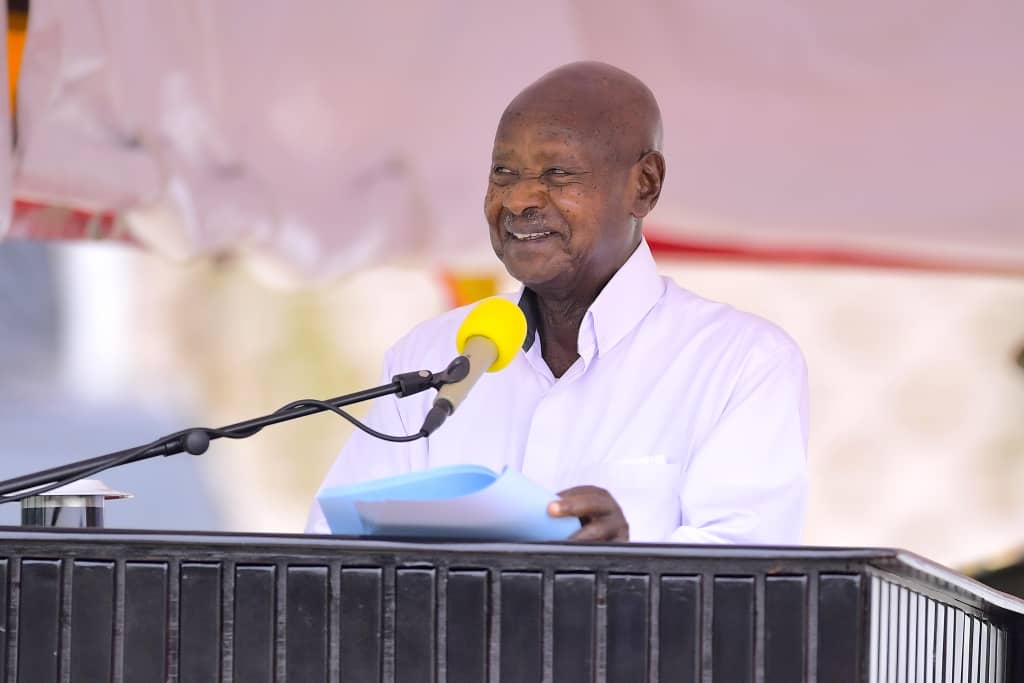President Yoweri Kaguta Museveni has commended Parliament for passing the Uganda Peoples’ Defence Forces (UPDF) Amendment Bill, 2025, saying it provides the military with the legal framework necessary to safeguard national stability, including the prosecution of civilians in military courts.
Speaking during the State of the Nation Address at Kololo Independence Grounds on Thursday, June 5, 2025, the President emphasized that the UPDF is not an ordinary institution but a key pillar of the state, and must therefore be handled uniquely.
“You cannot say the UPDF is like a company. It is a very powerful pillar of the state and must be handled in a special way. I congratulate the Speaker, the front bench, the ministers, and the NRM caucus for standing firm on this matter,” Museveni said.
The Commander-in-Chief’s remarks come amidst continuing debate over the constitutional validity of trying civilians in military courts. However, Museveni reiterated that security organs require flexibility to act decisively against threats.
Parliament has passed the Uganda Peoples’ Defence Forces (Amendment) Bill, 2025, in a highly contentious session marked by intense debate, division, and a walkout by some opposition MPs. The Bill, now awaiting President Museveni’s signature, introduces significant reforms to Uganda’s military justice system, including provisions that will allow civilians to be tried in military courts under specific circumstances.
Presented by the Minister of Defence and Veteran Affairs, Hon. Jacob Oboth, on May 20, 2025, the Bill was tabled as a response to the Supreme Court’s ruling in Attorney General vs Hon. Michael Kabaziguruka, which declared the trial of civilians in military courts unconstitutional under the existing UPDF Act.
Oboth clarified that the amendments do not arbitrarily target civilians but are meant to address individuals who commit military-related crimes, such as acquiring military equipment, impersonating soldiers, or conspiring with military personnel. “This law targets those acting in violation of military standards and not all Ugandans,” he said.
Hon. Wilson Kajwengye, chair of the joint committee on Defence and Internal Affairs, presented the majority report supporting the Bill but emphasized that civilians should only be subjected to military justice in exceptional cases, with guarantees of fair trial.
The Bill also introduces a clear court martial appeal process, establishes a Directorate of Military Prosecutions, and protects against premature execution of death penalties until the Supreme Court confirms them.
However, a minority report by Hon. Moses Okot (FDC) opposed the Bill, arguing that Clause 30 reintroduces a provision already nullified by the Supreme Court. He warned that this defies constitutional limits and undermines judicial independence. “This is not the conduct of a civilized democracy,” Okot declared, citing Articles 209 and 210 of the Constitution.
Despite the objections and the opposition walkout led by Leader of Opposition Rt Hon. Joel Ssenyonyi, Parliament passed the Bill with amendments. It now awaits the President’s assent to become law.
Among the amendments, Civilians may be tried by military courts only under specific military-related offences, including: Illegal possession or use of firearms and military equipment, impersonating Armed Forces personnel, committing crimes in collusion with UPDF soldiers.
The scope is limited, ordinary offences not related to military activity remain under civilian courts
It establishes a clear appeals pathway from lower to higher military courts and into civilian judiciary: Unit Court Martial , Division Court Martial , General Court Martial , Appeal to Court of Appeal and Final appeal to the Supreme Court. It also Includes clause to halt execution of any death sentence until the Supreme Court confirms it
The bill introduces a Directorate of Military Prosecutions to: Ensure professional and independent prosecution of military cases, mitigate overlap between judicial and prosecutorial roles and mandates transparency and independence in judicial appointments for military courts. It clarifies the mandate of the Military Courts Department to prevent conflicts in prosecutorial and judicial functions.
Under the bill, Judges are to be appointed by the Commander-in-Chief from a list recommended by the Judicial Service Commission.
Judges must take judicial oaths and adhere to legal ethical standards
It also responds directly to the Supreme Court ruling (Attorney General v Kabaziguruka, Jan 2021) that declared trial of civilians in military courts unconstitutional, by: Limiting such trials to exceptional circumstances only.Embedding fair trial safeguards (appeals, oversight, judicial independence)
New provisions regulate wearing military-style uniforms without UPDF insignia, to help separate military personnel from civilians.




